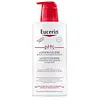What's inside
What's inside
 Key Ingredients
Key Ingredients

 Benefits
Benefits

 Concerns
Concerns

 Ingredients Side-by-side
Ingredients Side-by-side

Water
Skin ConditioningCetyl Palmitate
EmollientGlycerin
HumectantParaffinum Liquidum
EmollientPanthenol
Skin ConditioningCetyl Alcohol
EmollientPolybutene
Sorbitan Stearate
EmulsifyingAluminum Starch Octenylsuccinate
AbsorbentTocopheryl Acetate
AntioxidantSodium Citrate
BufferingCitric Acid
BufferingCarbomer
Emulsion StabilisingDimethicone
EmollientPhenoxyethanol
PreservativePentylene Glycol
Skin ConditioningEthylhexylglycerin
Skin ConditioningWater
Skin ConditioningParaffinum Liquidum
EmollientCetyl Alcohol
EmollientPropylene Glycol
HumectantDimethicone
EmollientCetearyl Alcohol
EmollientCetearyl Ethylhexanoate
EmollientIsopropyl Myristate
EmollientCaprylic/Capric Triglyceride
MaskingPEG-8 Distearate
EmulsifyingGlyceryl Stearate
EmollientHydroxyethyl Urea
HumectantPhenoxyethanol
PreservativePEG-100 Stearate
Parfum
MaskingTriethanolamine
BufferingCaprylyl Glycol
EmollientCarbomer
Emulsion StabilisingAllantoin
Skin ConditioningHelianthus Annuus Seed Oil
EmollientHydrogenated Microcrystalline Wax
Emulsion StabilisingPlukenetia Volubilis Seed Oil
EmollientTetrasodium Glutamate Diacetate
Borago Officinalis Extract
EmollientRosmarinus Officinalis Leaf Extract
AntimicrobialTocopherol
AntioxidantBHT
AntioxidantAscorbyl Palmitate
AntioxidantWater, Paraffinum Liquidum, Cetyl Alcohol, Propylene Glycol, Dimethicone, Cetearyl Alcohol, Cetearyl Ethylhexanoate, Isopropyl Myristate, Caprylic/Capric Triglyceride, PEG-8 Distearate, Glyceryl Stearate, Hydroxyethyl Urea, Phenoxyethanol, PEG-100 Stearate, Parfum, Triethanolamine, Caprylyl Glycol, Carbomer, Allantoin, Helianthus Annuus Seed Oil, Hydrogenated Microcrystalline Wax, Plukenetia Volubilis Seed Oil, Tetrasodium Glutamate Diacetate, Borago Officinalis Extract, Rosmarinus Officinalis Leaf Extract, Tocopherol, BHT, Ascorbyl Palmitate
Ingredients Explained
These ingredients are found in both products.
Ingredients higher up in an ingredient list are typically present in a larger amount.
Carbomer is a polymer of acrylic acid. Its main role is to create a gel consistency.
A high amount of carbomer can cause pilling or balling up of products. Don't worry, most products contain 1% or less of carbomer.
Cetyl Alcohol is a fatty alcohol. Fatty Alcohols are most often used as an emollient or to thicken a product.
Its main roles are:
Though it has "alcohol" in the name, it is not related to denatured alcohol or ethyl alcohol.
The FDA allows products labeled "alcohol-free" to have fatty alcohols.
Learn more about Cetyl AlcoholDimethicone is a type of synthetic silicone created from natural materials such as quartz.
What it does:
Dimethicone comes in different viscosities:
Depending on the viscosity, dimethicone has different properties.
Ingredients lists don't always show which type is used, so we recommend reaching out to the brand if you have questions about the viscosity.
This ingredient is unlikely to cause irritation because it does not get absorbed into skin. However, people with silicone allergies should be careful about using this ingredient.
Note: Dimethicone may contribute to pilling. This is because it is not oil or water soluble, so pilling may occur when layered with products. When mixed with heavy oils in a formula, the outcome is also quite greasy.
Learn more about DimethiconeParaffinum Liquidum is also known as liquid paraffin. It is a type of highly refined mineral oil.
Like other oils, Paraffinum Liquidum has emollient properties. Emollients help soothe and soften the skin. By creating a barrier to trap moisture within, emollients help keep your skin hydrated.
Paraffinum Liquidum does not irritate the skin and is non-comedogenic.
Learn more about Paraffinum LiquidumPhenoxyethanol is a preservative that has germicide, antimicrobial, and aromatic properties. Studies show that phenoxyethanol can prevent microbial growth. By itself, it has a scent that is similar to that of a rose.
It's often used in formulations along with Caprylyl Glycol to preserve the shelf life of products.
Water. It's the most common cosmetic ingredient of all. You'll usually see it at the top of ingredient lists, meaning that it makes up the largest part of the product.
So why is it so popular? Water most often acts as a solvent - this means that it helps dissolve other ingredients into the formulation.
You'll also recognize water as that liquid we all need to stay alive. If you see this, drink a glass of water. Stay hydrated!
Learn more about Water